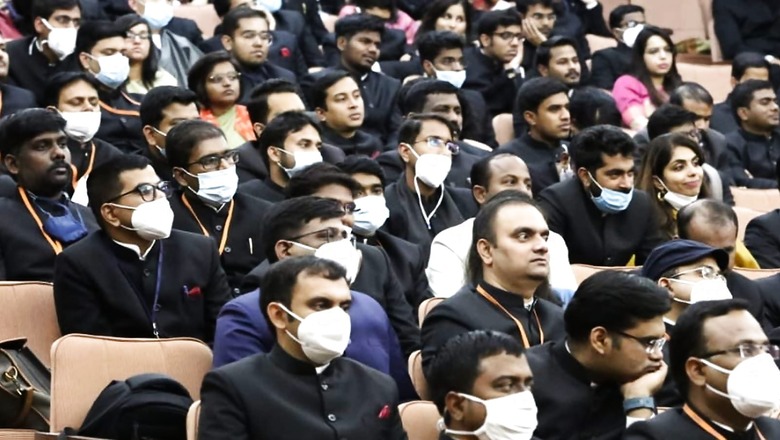
views
IAS officers are now getting empaneled as secretaries and additional secretaries to the central government within fewer years of service than before, a News18.com analysis of empanelment orders issued in the last five years has shown.
Empaneling here refers to the appraisal process through which civil servants are made eligible to take up a certain position in the central government.
As per the data, senior Indian Administrative Services (IAS) officers have been getting empaneled as secretaries to the Government of India in just 32 years of service for the last five years, as compared to 33 or 34 years of service in the previous years.
Last month, the Narendra Modi government appointed secretaries to head some of its critical ministries, including the freshly minted Ministry of Cooperation as well as the ministries of Civil Aviation and Culture, and departments of Personnel & Training, Telecommunications, Higher Education, and Promotion of Industry & Internal Trade among others.
A majority of the secretaries appointed are 1989 batch IAS officers and were empaneled in February this year within 32 years of service, as compared to officers of the 1984 batch or the batches prior to that, who got empaneled as secretaries in 2016 after 33 years of service.
In fact, empanelment orders issued in the last few years show that IAS officers of the 1985, 1986, 1987, 1988 and 1989 batches have all got empaneled as secretaries within 32 years of service.
The trend is even more pronounced when it comes to empanelment of senior IAS officers as additional secretaries to the central government. The latest batches of officers are getting empaneled as additional secretaries to the central government after just 26 years of service, as compared to 30 or 31 years of service in the previous years.
For instance, the 1995 batch of IAS officers got empaneled as additional secretaries earlier this month within just 26 years of service. Even the 1994 batch of IAS officers got empaneled after 26 years of service.
While the officers of batches prior to 1994 got empaneled as additional secretaries in 27, 28, 29 years of service, officers of the 1986 and 1987 batches got empaneled after 30 years. In 2017, both the 1987 and 1988 batches of officers were together empaneled as additional secretaries in the central government.
This figure, however, varies for officers of services other than the IAS, a large number of who got empaneled to senior bureaucracy in the last five years, a change from the past trend when IAS officers primarily occupied top positions in the central government.
Decoding the Empanelment
Multiple retired and senior government officials told News18.com that the reasons for faster empanelment of IAS officers are manifold.
Talking to News18.com, a senior government official explained that the primary reason why the Narendra Modi dispensation would have liked to empanel senior IAS officers as secretaries and additional secretaries earlier than before is to have a larger pool of empaneled officers available for the government to pick and choose from for the limited number of secretary and additional secretary level posts in the central government.
“This government has been extremely choosy about the secretaries and additional secretaries appointed to all the ministries and departments. Empaneling the batches faster will mean the government would have a larger pool of senior officers available to choose from, for the fewer positions available in the Centre for them,” a senior bureaucrat said on the condition of anonymity.
The official further explained that another reason for faster empanelment was the smaller batches of officers who joined the civil services in the early and mid-90s as compared to the latest batches. “The batches during this period were remarkably small. While the number of IAS intake has been 180 in the last few years, the numbers went down to as low as 50 in the 1990s,” the official said.
The civil services examination is conducted by the Union Public Services Commission. While the intake of the number of IAS, Indian Police Service (IPS) and Indian Foreign Service (IFS) was drastically cut down in the 1990s, it was increased subsequently to make up for the deficit of officers. The intake has remained largely constant in the last five years.
KBS Sidhu, a Punjab-cadre IAS officer of the 1984 batch, who recently retired as Punjab special chief secretary, said shortening the length of service for empanelment as secretary and additional secretary in the central government is accounted for by the fact that the average age of batches under consideration, at recruitment, was relatively high.
He also agreed that this reflects the intention of the government to have a larger pool of eligible officers to choose from. “It also shortens the ‘middlescence’ plateau, ranging from the joint secretary to the additional secretary,” he said.
More Time in the Ministry
A former DoPT secretary told News18.com that another reason could be the shortage of officers at the central government. “Some officers want to continue working in the states, and at times, states, too, don’t release officers for central deputation, leading to a shortage of middle and top-rung bureaucrats at the Centre,” he said.
He added that another feature noted in the current dispensation is the frequent lateral shifting of secretary-level officers, which was rare earlier.
“A longer tenure at secretary rank will also mean that despite change of ministry, an officer can have a reasonably long tenure in a ministry,” the former secretary said.
A second senior government official said faster empanelment will help the secretaries and also aid governance in some ways. “Earlier, officers got appointed as secretaries at the far end of their careers,” the official said. “Empaneling and posting them faster as secretaries will ensure that they can spend considerable amount of time — two or three years — in a ministry or department, and thus get the key reforms implemented in the sector before they superannuate,” the official added.
Read all the Latest News , Breaking News and IPL 2022 Live Updates here.




















Comments
0 comment